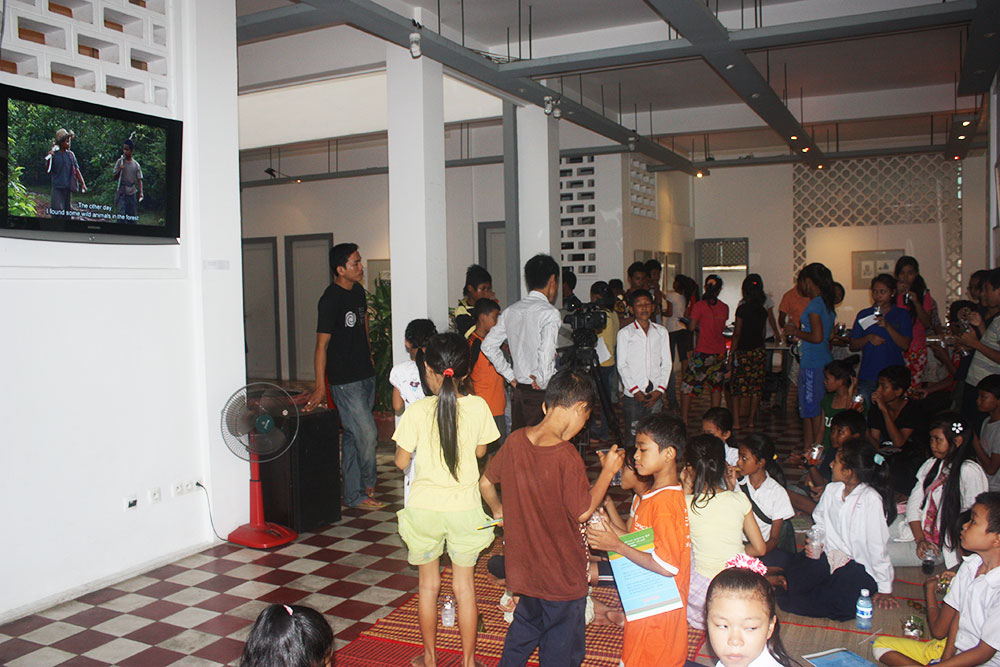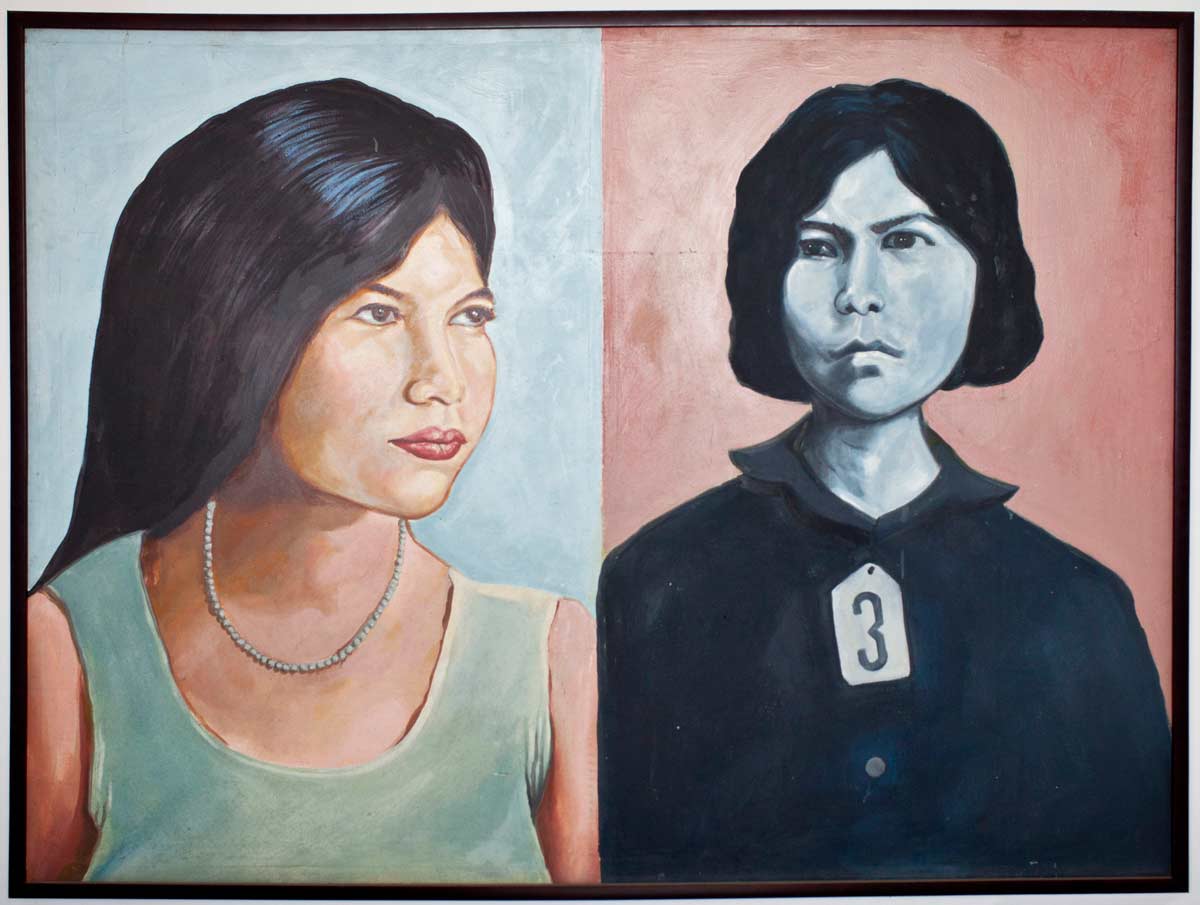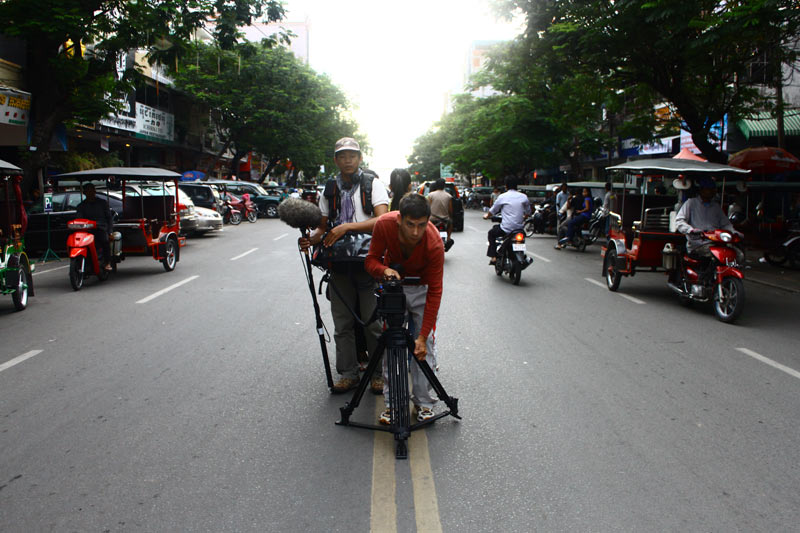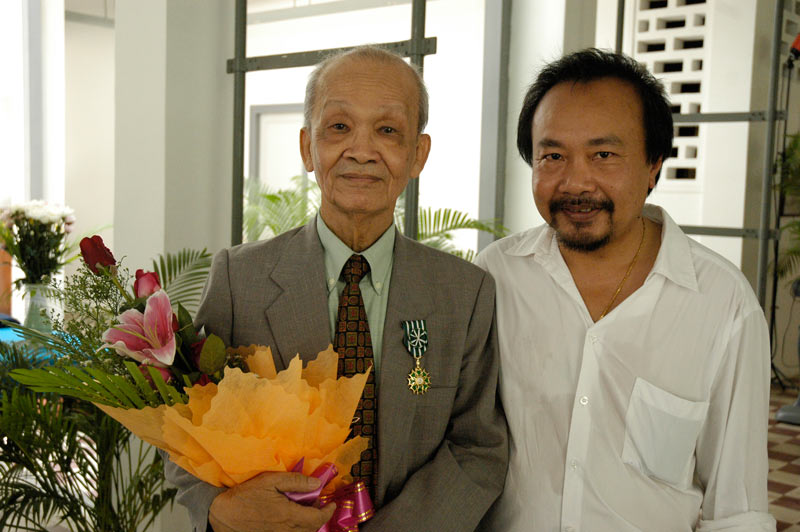Bophana Audiovisual Resource Center
About Bophana Center
"Cambodia is a young country, and we must give prospects to the youth. The past tells us what may happen tomorrow; and images are here to make us think and feed us; it is a great strength to move forward. Education helps us analyze the images and master the techniques; creation enables us to speak up but also express what we see and how we feel."
— Rithy Panh, co-fondateur du centre Bophana

Bophana Center acquires film, television, photography and sound archives on Cambodia all around the world; and it gives free public access to this precious heritage. For Cambodians, it opens the door to huge swathes of their memory. Since it opened on December 4, 2006, over 240,000 people have (re)discovered these documents in Phnom Penh and throughout the country. For teachers, students, researchers or journalists, it is an exceptional documentary base. Today nearly 700 hours of video are available, including: the first movies of the Lumière brothers in the late nineteenth century; recent fictions by Cambodian directors; TV coverage; nonprofit movies; documentaries; Norodom Sihanouk’s movies; etc. Meanwhile, hundreds of archives are being organized and indexed.
From the very beginning, Bophana Center’s main objective has been to offer young Cambodians practical training as well as professional support over the long run. Thus, archivists, film and audiovisual technicians as well as young filmmakers have been trained at Bophana Center. The center is now opening to multimedia: it has launched pilots and a new training curriculum is being developed. While being a discussion forum for the artists, Bophana Center also supports art creation in all its forms and produces documentaries and fictions about Cambodia, which are the archives of tomorrow. “Red Wedding” in particular stood out in major festivals, including Sundance and IDFA. Film and broadcasting productions have taken an increasing part in our activity, This enables us to become more financially independent and echoes our ambition to strengthen the audiovisual sector in Cambodia.
Bophana: A Symbol
Bophana is 25 when she is executed by the Khmer Rouge. Her body is thrown into the mass grave of Choeung Ek on March 18, 1977. On the same day her husband Ly Sitha is killed as well. For five months she has been tortured and has written thousands pages of confessions. She tells how her father, a teacher and district chief, was killed in a Khmer Rouge ambush. She had to flee her home and take refuge with her two sisters in Kompong Thom.
Read more »
Our Missions
Save and Revive Yesterday’s and Today’s Memories
Cambodian memories have been destroyed by three decades of war. Collecting film and audiovisual archives will help Cambodians to gradually restore this priceless heritage, and it will enable them to understand their past, build up their present and invent their future.
The archive collection first started in France and then spread to other countries (notably the US) and Cambodia. All the collected documents, which are sometimes restored at Bophana Center, are made available to the public in a trilingual database (French, English, and Khmer). These archives are brought to life by the conferences, debates, exhibitions, and workshops the center organizes. All these activities enable the archives documents to be shared with different audiences, while promoting exchange and reflection.

Train the Technicians and Film Directors of Tomorrow
In Cambodia, 70 percent of the population is under 30; and the youth is highly connected. They are not only exposed to a huge amount of images; they also want to have the opportunity to express themselves. Unfortunately, there is no real training for careers in filmmaking and broadcasting in Cambodia.
To encourage critical eye and promote a quality Cambodian film production, Bophana Center trains young people in filmmaking and broadcasting techniques. Once they complete their training, they can assist local and foreign directors.

Founders
Rithy Panh is the first Cambodian filmmaker who was ever nominated for an Oscar for his movie "The Missing Picture" in 2013. In the same year he received the Jury Prize in "Un Certain Regard" at the Cannes Festival. He directed many documentaries, including "S-21: The Khmer Rouge Killing Machine," for which he was awarded with the prestigious Albert Londres Prize in 2004.
He was also instrumental in establishing the Bophana Center alongside leu Pannakar, Senator and Minister of the Royal Palace. Ieu Pannakar devoted his life to cinema and broadcasting in Cambodia. He graduated from Ecole de Vaugirard (now Ecole Louis Lumière), and from 1955 to 1970 he was in charge of the Film, Photography and Broadcasting Department. As such, he trained most of the Cambodian technicians of the time; and when the Khmer Rouge regime collapsed in 1979, he took up his job to help revive the audiovisual sector in Cambodia.

Le 25 juillet 2008, celui qui incarne la mémoire du cinéma et de la télévision cambodgienne, Ieu Pannakar, a été décoré "Officier des arts et des lettres" par l’ambassadeur de France à Phnom Penh, en présence de Rithy Panh
Board of Directors
Phloeun PRIM
Chairperson
Mr. Phloeun was born during the genocide in Cambodia, and raised in Canada. He is proud to have returned to Cambodia and be part of the movement to use the arts for healing, social transformation and economic development. Phloeun has spearheaded our transformation from a grassroots project reviving traditional arts to a leading cultural agency in Cambodia. Under his directorship at Cambodian Living Arts, we have extended our reach from local to international programming and to evolve its role from straightforward transmission of traditions to stimulating expression and innovation.

Sovichea CHEAP
Treasurer
He started to work in 1988 for local film production as a Camera Assistant.
He followed various technical trainings in France and Cambodia and soon became an Editor for national productions.
In 2002, he left the camera and editing to become Unit Production Manager, then became Line Producer on large foreign films productions shot in Cambodia. He also organized and followed most of the films productions of French- Cambodian filmmaker Mr. Rithy Panh.
In 2009, he is appointed Director of Cambodia Film Commission as he has the knowledge of the Cambodian administration system and knows as well the reality of films production.

Cédric ELOY
Chair of Program Committee
Graduate in International Business and Management, Cedric Eloy has worked for the movie industry since 1998 when he started as General Secretary of the Amiens International Film Festival in France, an estblished festival dedicated to cinema of the southern hemisphere and involved in world events (Cannes, Fespaco, Montreal...).
In 2003 he set up the Picardy Film Commission in northern France, and has supported over 50 film shoots a year such as Jean-Pierre Jeunet, Stephen Frears and the famous HBO series Merlin.
In 2009, he is appointed International advisor of the newly created Cambodia Film Commission, an organization under the Ministry of Culture and Fine Arts of Cambodia to promote Cambodia as a film destination. In 2010, he also initiates the Cambodia International Film Festival (CIFF).
Since 2011, he is also actively involved in the Asian Film Commissions Network (AFCNet) in the board of director, bringing to Asia his experience of the European film industry and his worldwide network.

Kérya CHAU SUN
Member
She is spokesperson and advisor to the APSARA National Authority, after having established the Department of Tourism Development and the Department of Cultural Development, Museums and Heritage Standards of the institution.
Since 2004, she is a member of the Secretariat of the International Coordinating Committee for the Safeguarding and Development of the Historic Site of Angkor (ICC).
She is appointed since 2010 as National Focal Point for UNESCO's World Cultural Heritage.
Doctor of geography, Sorbonne University, she specializes in tourism, site management and cultural heritage.





